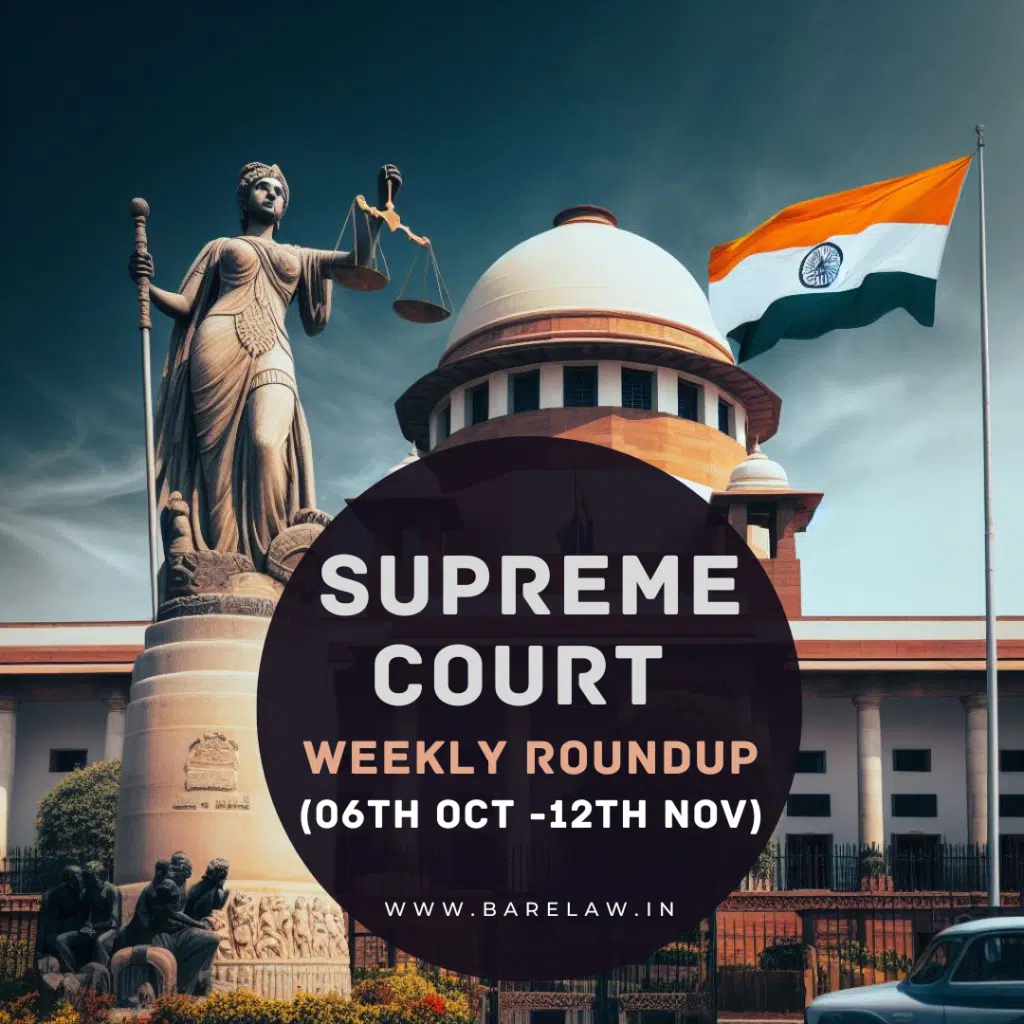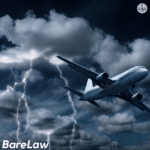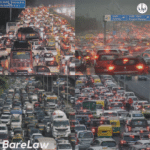
Supreme Court Weekly Roundup (6th Nov-12th Nov
- Vishnubhai Ganpatbhai Patel & Anr. V. State of Gujarat: The Supreme Court ruled that an accused does not have to serve a minimum sentence before their request for sentence suspension can be considered. The appellants were convicted under Section 304 Part I of the Indian Penal Code and granted bail pending the High Court’s decision on the appeal.
- Bambhaniya Sagar Vasharambhai v. Union Of India: The Supreme Court dismissed a student’s plea for medical admission under the Persons with Disabilities quota for the MBBS course despite an 80% locomotor disability. The court emphasized the need for the Central government to find solutions to facilitate the effective participation of persons with disabilities.
- Lombardi Engineering Ltd. Vs. Uttarakhand Jal Vidyut Nigam Ltd.: This case involved a petition under Section 11(6) of the Arbitration and Conciliation Act, 1996, filed by Lombardi Engineering Ltd., a Swiss design consultancy firm. The dispute was related to a contract for consultancy services and preparation of a detailed project report for the Arakot Tiuni Hydro Electric Project in Uttarakhand. The Supreme Court had to consider the appointment of an arbitrator for the adjudication of disputes arising from the contract which was taken over by Uttarakhand Jal Vidyut Nigam Ltd from the original contracting party.
- Union of India & Ors v Dilip Paul: The Supreme Court dealt with an appeal by the Union of India against a High Court judgment which had set aside a disciplinary penalty of withholding 50% of the pension for a respondent in connection with allegations of sexual harassment. The case underlined the gravity of sexual harassment allegations and the need for careful scrutiny to avoid misuse of laws intended to protect against such harassment.
- C. RAJENDRAN & ORS. v. UNIVERSITY OF CALICUT & ORS.: The Supreme Court ruled that professors are entitled to receive salary for the full academic year if they continue to teach until the end of the academic year, even if they reach retirement age mid-term. The Court found that the professors had fulfilled their moral responsibility to complete the academic session and were entitled to compensation for the period served beyond their superannuation age. The decision by a Single Judge Bench of the High Court in favor of the professors was upheld, and the University was directed to disburse the salary for the extended period with interest.
- Manjunath & Ors. Vs. State of Karnataka: In this case, the Supreme Court dealt with an appeal by six individuals against a High Court decision that overturned their initial acquittal by a lower court. The High Court convicted them for offences under various sections of the Indian Penal Code, including unlawful assembly, rioting, and murder, and sentenced them to four years of rigorous imprisonment and a fine. The case originated from an incident on August 6, 1997, where the accused allegedly attacked and seriously injured the deceased with weapons like iron rods and choppers.
- Aditi alias Mithi Vs. Jitesh Sharma: The Supreme Court addressed an appeal involving the reduction of a minor daughter’s maintenance by the High Court. The Family Court had initially awarded the appellant, the minor daughter, a monthly maintenance of ₹20,000, which the High Court later reduced to ₹7,500. The Supreme Court reviewed the case, considering the earlier financial status of the father and his current claimed financial distress. The case highlighted the challenges in assessing maintenance payments, leading to the Supreme Court’s establishment of guidelines for a uniform Affidavit of Disclosure of Assets and Liabilities in such proceedings.
- State of Karnataka Vs. T. Naseer @ Nasir @ Thandiantavida Naseer @ Umarhazi @ Hazi & Ors.: The Supreme Court heard an appeal from the State of Karnataka concerning a High Court order that upheld the Trial Court’s rejection of the prosecution’s application under Section 311 of the Cr.P.C. The case involved a series of bomb blasts in Bangalore in 2008, resulting in the death of a woman and injuries to several individuals. The prosecution sought to recall a witness to produce a certificate under Section 65B of the Evidence Act, which was necessary for admitting certain electronic evidence. The application was deemed delayed by the Trial Court, and this decision was contested in the Supreme Court.
- Jyotirmay Ray Vs. Field General Manager, Punjab National Bank: The Supreme Court addressed the case of a Sr. Manager compulsorily retired from Punjab National Bank who was denied benefits like leave encashment, employer’s contribution to provident fund, gratuity, and pension. The High Court partly allowed his writ petition, ordering the bank to release provident fund contributions and gratuity with interest, as well as leave encashment, but denied the pension benefit as he was not in service when the pension scheme became operational.
- ILAMARAN V. THE STATE REP. BY THE INSPECTOR OF POLICE: The Supreme Court directed the Madras High Court to amend its rules to ensure that the state’s name is reflected in the cause title of criminal cases. This direction was given while considering a special leave petition (SLP) against a Madras High Court order, noting the absence of the state’s name in SLPs from Tamil Nadu. The Supreme Court stressed the need to examine whether the omission was a matter of practice or the rules and directed the Registrar General of the Madras High Court to bring the matter to the notice of the Chief Justice for appropriate amendments.
- Hariprasad @Kishan Sahu v. State of Chhattisgarh 2023 (SC) 968: The Supreme Court cleared charges against a person accused of a case related to suspected liquor poisoning leading to death. The argument about delay in lodging the FIR, a common issue in criminal cases, was addressed, and the person was cleared of the charges dating back two decades.
- BINU TAMTA V. HIGH COURT OF DELHI 2023 (SC) 969: The Supreme Court refused a plea to make its Gender Sensitization and Sexual Harassment of Women at the Supreme Court of India (Prevention, Prohibition, and Redressal) Regulations, 2013, gender-neutral to include LGBTQIA+ persons. The court upheld that the regulations aimed to protect ‘aggrieved women’ and that amending them would dilute their purpose. The counsel for the petitioner argued that the existing regulations were inadequate for LGBTQIA+ persons and cited the National Legal Services Authority (NALSA)
- Ashwini Kumar Upadhyay v Union of India: This case is about whether India should have uniform laws for divorce, maintenance, and alimony that apply to all citizens, regardless of religion or gender. The petitioner, Ashwini Kumar Upadhyay, argues that the current personal laws are complex and discriminatory, violating the right to life and dignity, the right to equality, and the right against discrimination based on sex and religion. He advocates for a Uniform Civil Code to achieve gender and religion-neutral laws in these matters, a subject of considerable debate in India. The Supreme Court’s decision on this matter is expected to significantly contribute to the discourse on a Uniform Civil Code.
- THANKAMMA BABY vs. THE REGIONAL PROVIDENT FUND COMMISSIONER: The Supreme Court dealt with whether the appellant’s business, which involved manufacturing, assembling, and selling umbrellas, should be classified under ‘trading and commercial establishments’ as per a 1962 notification under the Employees’ Provident Fund and Miscellaneous Provisions Act, 1952. The appellant contested the classification, while the respondent, the Regional Provident Fund Commissioner, upheld it. The Court ultimately held that the Central Government has the authority to specify establishments or classes of establishments not listed in Schedule I of the 1952 Act. It emphasized the social welfare intent of the legislation, describing it as a measure of social justice. Rejecting the appellant’s interpretation, the Court adopted a purposive approach to give effect to the legislature’s intention, concluding that the notification could be issued for any factory engaged in industries not specified in Schedule I. This meant that the appellant’s business was indeed covered under the said notification.
For detailed information, one must refer to the judgments or legal reporting on these cases to understand the facts, legal issues, and the rulings of the Supreme Court on each matter.



